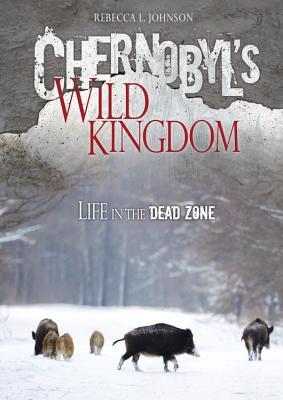Chernobyl's Wild Kingdom is a children's non fiction book by Rebecca L. Johnson. Early on April 26, 1986, Nuclear Reactor Number 4 at the Chernobyl power plant in northern Ukraine exploded. Within minutes, deadly radioactive fallout was raining down on the region, sweeping into southern Belarus and southwestern Russia. Pripyat, Ukraine, the city nearest the plant, was evacuated the next day. Almost three decades later, it is still a radioactive ghost town. Most people, including many scientists, assumed that the Zone would remain a barren wasteland for a very long time. But that's not what happened. To almost everyone's surprise, life in the Zone wasn't extinguished at all. In fact, in the decades since the nuclear disaster, Chernobyl's Exclusion Zone has become a green, thickly forested landscape. Wild boars, deer, elk, moose, foxes, bears, badgers, and several dozen wolf packs make their home there. So do insects, amphibians, reptiles, and hundreds of species of birds.
In Chernobyl's Wild Kingdom readers are introduced to a cast of international scientists investigating the Zone's wildlife. We see how the disaster happened and how it was handled in the hours, days, and weeks that followed. The speed and severity of the disaster is frankly frightening, and the rebound make by nature is amazing. The information about the wildlife that seems to be thriving in an environment that would kill humans leaves me hope that even if we continue to destroy what we have, innocent animals and organisms might still find a way to survive, and hopefully prosper. The Bank Voles and other small rodents have been extensively tested, and there are controversial theories that could answer the questions of how these little critters are thriving rather than mutating and dying. While there are animals, trees, and plants that seem to be mutation free, there are also a number of creatures showing a variety of mutations and changes. There are many answers here in this volume, and many new questions to be answered. There are lessons we can learn from the events and aftermath at Chernobyl, some of which can apply to the more recent nuclear disaster at Fukushima, Japan, and to the globe's nuclear-energy future.
Chernobyl's Wild Kingdom is a well written and informative read. The events and aftermath of the disaster are terrifying and hold many secrets and opportunities for answers. The discoveries scientist have made there, and with the animals from there, can help us understand the ramifications of nuclear power and weapons, as well as how our use and care of them can effect the planet and all living things.


No comments:
Post a Comment